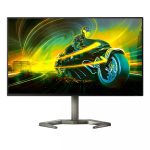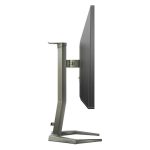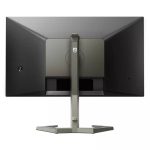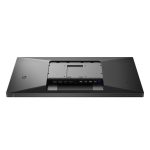Philips has expanded its vast portfolio of gaming monitors with two new high-end products. Both share the same aesthetics, but the spec sheet shows some key differences.
Starting with the 27M1F5800, this gaming monitor uses a 27-inch Nano IPS 4K panel with 144Hz refresh rate, and 1ms G2G response time. Featuring a brightness of 450nits and contrast ratio of 1000:1, the monitor's 10-bit (8-bit +FRC) panel can cover 98% of the DCI-P3 gamut and 100% of the sRGB spectrum. Creators might also be interested in knowing the monitor can cover 84.8% of the NTSC gamut and 93.1% of the Adobe RGB colour space.
Philips's latest 4K monitor is VESA DisplayHDR 600 certified and features multiple HDR modes to choose from. There's also a LowBlue mode, flicker-free technology and Adaptive-Sync.
Available connectivity options include 2x HDMI 2.1 ports, 2x DisplayPort 1.4, a 3.5mm audio-out jack, and a USB hub with 4x USB 3.2 ports (2x with fast charge). The included SmartErgoBase is mounted using VESA 100x100mm standard and allows the user to tilt, swivel, pivot and adjust the height.
The other monitor is the 27M1F5500P, which features a 27-inch Nano IPS panel with 1ms G2G of response time. Unlike the 27M1F5800, this panel has QHD resolution and a whopping 240Hz refresh rate. In addition, brightness is set at 450nits and the contrast ratio at 1000:1, allowing the 10-bit panel to cover the same 98% of the DCI-P3 gamut. However, sRGB, NTSC, and Adobe RGB coverages are considerably higher, with 131.9%, 111.6% and 92.9%, respectively.
Like the other Philips monitor, it also supports Adaptive-Sync and is VESA DisplayHDR 600 certified. Moreover, it features a LowBlue mode and flicker-free technology.
The video input and connectivity interfaces are similar to the 27M1F5800, but the HDMI ports are “only” 2.0. As for the stand, it's the same SmartErgoBase included with its 4K counterpart.
Discuss on our Facebook page, HERE.
KitGuru says: Would you go for the 4K monitor with 144Hz, or do you prefer the QHD monitor with a 240Hz refresh rate?
 KitGuru KitGuru.net – Tech News | Hardware News | Hardware Reviews | IOS | Mobile | Gaming | Graphics Cards
KitGuru KitGuru.net – Tech News | Hardware News | Hardware Reviews | IOS | Mobile | Gaming | Graphics Cards






